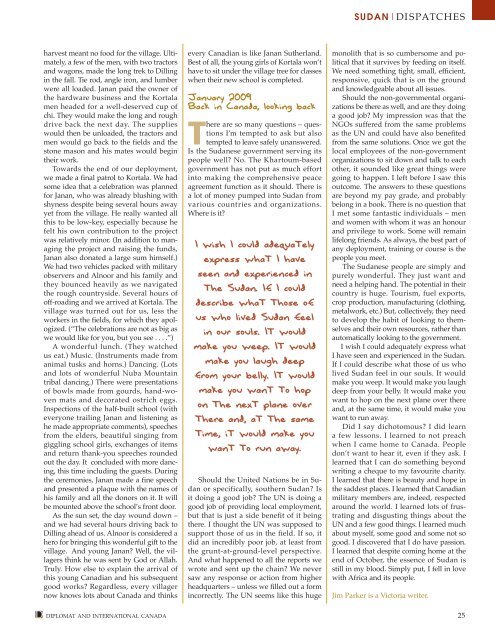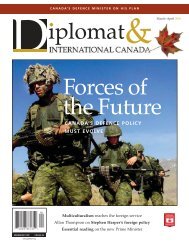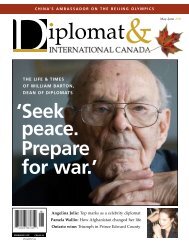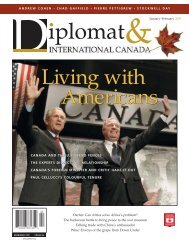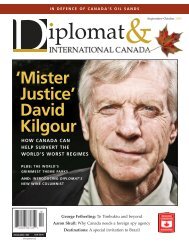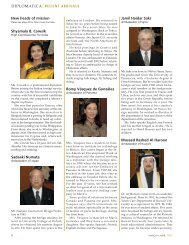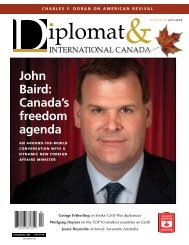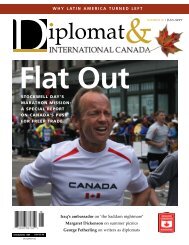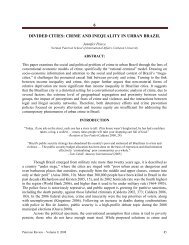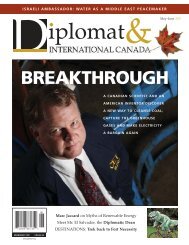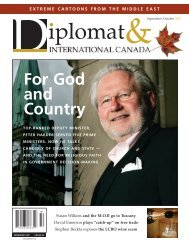Lord Jim of Dilling - Diplomat Magazine
Lord Jim of Dilling - Diplomat Magazine
Lord Jim of Dilling - Diplomat Magazine
- No tags were found...
Create successful ePaper yourself
Turn your PDF publications into a flip-book with our unique Google optimized e-Paper software.
sudan|Di spatchesharvest meant no food for the village. Ultimately,a few <strong>of</strong> the men, with two tractorsand wagons, made the long trek to <strong>Dilling</strong>in the fall. Tie rod, angle iron, and lumberwere all loaded. Janan paid the owner <strong>of</strong>the hardware business and the Kortalamen headed for a well-deserved cup <strong>of</strong>chi. They would make the long and roughdrive back the next day. The supplieswould then be unloaded, the tractors andmen would go back to the fields and thestone mason and his mates would begintheir work.Towards the end <strong>of</strong> our deployment,we made a final patrol to Kortala. We hadsome idea that a celebration was plannedfor Janan, who was already blushing withshyness despite being several hours awayyet from the village. He really wanted allthis to be low-key, especially because hefelt his own contribution to the projectwas relatively minor. (In addition to managingthe project and raising the funds,Janan also donated a large sum himself.)We had two vehicles packed with militaryobservers and Alnoor and his family andthey bounced heavily as we navigatedthe rough countryside. Several hours <strong>of</strong><strong>of</strong>f-roading and we arrived at Kortala. Thevillage was turned out for us, less theworkers in the fields, for which they apologized.(“The celebrations are not as big aswe would like for you, but you see . . . .”)A wonderful lunch. (They watchedus eat.) Music. (Instruments made fromanimal tusks and horns.) Dancing. (Lotsand lots <strong>of</strong> wonderful Nuba Mountaintribal dancing.) There were presentations<strong>of</strong> bowls made from gourds, hand-wovenmats and decorated ostrich eggs.Inspections <strong>of</strong> the half-built school (witheveryone trailing Janan and listening ashe made appropriate comments), speechesfrom the elders, beautiful singing fromgiggling school girls, exchanges <strong>of</strong> itemsand return thank-you speeches roundedout the day. It concluded with more dancing,this time including the guests. Duringthe ceremonies, Janan made a fine speechand presented a plaque with the names <strong>of</strong>his family and all the donors on it. It willbe mounted above the school’s front door.As the sun set, the day wound down –and we had several hours driving back to<strong>Dilling</strong> ahead <strong>of</strong> us. Alnoor is considered ahero for bringing this wonderful gift to thevillage. And young Janan? Well, the villagersthink he was sent by God or Allah.Truly. How else to explain the arrival <strong>of</strong>this young Canadian and his subsequentgood works? Regardless, every villagernow knows lots about Canada and thinksevery Canadian is like Janan Sutherland.Best <strong>of</strong> all, the young girls <strong>of</strong> Kortala won’thave to sit under the village tree for classeswhen their new school is completed.January 2009Back in Canada, looking backThere are so many questions – questionsI’m tempted to ask but alsotempted to leave safely unanswered.Is the Sudanese government serving itspeople well? No. The Khartoum-basedgovernment has not put as much effortinto making the comprehensive peaceagreement function as it should. There isa lot <strong>of</strong> money pumped into Sudan fromvarious countries and organizations.Where is it?I wish I could adequatelyexpress what I haveseen and experienced inthe Sudan. If I coulddescribe what those <strong>of</strong>us who lived Sudan feelin our souls. It wouldmake you weep. It wouldmake you laugh deepfrom your belly. It wouldmake you want to hopon the next plane overthere and, at the sametime, it would make youwant to run away.Should the United Nations be in Sudanor specifically, southern Sudan? Isit doing a good job? The UN is doing agood job <strong>of</strong> providing local employment,but that is just a side benefit <strong>of</strong> it beingthere. I thought the UN was supposed tosupport those <strong>of</strong> us in the field. If so, itdid an incredibly poor job, at least fromthe grunt-at-ground-level perspective.And what happened to all the reports wewrote and sent up the chain? We neversaw any response or action from higherheadquarters – unless we filled out a formincorrectly. The UN seems like this hugemonolith that is so cumbersome and politicalthat it survives by feeding on itself.We need something tight, small, efficient,responsive, quick that is on the groundand knowledgeable about all issues.Should the non-governmental organizationsbe there as well, and are they doinga good job? My impression was that theNGOs suffered from the same problemsas the UN and could have also benefitedfrom the same solutions. Once we got thelocal employees <strong>of</strong> the non-governmentorganizations to sit down and talk to eachother, it sounded like great things weregoing to happen. I left before I saw thisoutcome. The answers to these questionsare beyond my pay grade, and probablybelong in a book. There is no question thatI met some fantastic individuals – menand women with whom it was an honourand privilege to work. Some will remainlifelong friends. As always, the best part <strong>of</strong>any deployment, training or course is thepeople you meet.The Sudanese people are simply andpurely wonderful. They just want andneed a helping hand. The potential in theircountry is huge. Tourism, fuel exports,crop production, manufacturing (clothing,metalwork, etc.) But, collectively, they needto develop the habit <strong>of</strong> looking to themselvesand their own resources, rather thanautomatically looking to the government.I wish I could adequately express whatI have seen and experienced in the Sudan.If I could describe what those <strong>of</strong> us wholived Sudan feel in our souls. It wouldmake you weep. It would make you laughdeep from your belly. It would make youwant to hop on the next plane over thereand, at the same time, it would make youwant to run away.Did I say dichotomous? I did learna few lessons. I learned to not preachwhen I came home to Canada. Peopledon’t want to hear it, even if they ask. Ilearned that I can do something beyondwriting a cheque to my favourite charity.I learned that there is beauty and hope inthe saddest places. I learned that Canadianmilitary members are, indeed, respectedaround the world. I learned lots <strong>of</strong> frustratingand disgusting things about theUN and a few good things. I learned muchabout myself, some good and some not sogood. I discovered that I do have passion.I learned that despite coming home at theend <strong>of</strong> October, the essence <strong>of</strong> Sudan isstill in my blood. Simply put, I fell in lovewith Africa and its people.<strong>Jim</strong> Parker is a Victoria writer.diplomat and international canada 25


